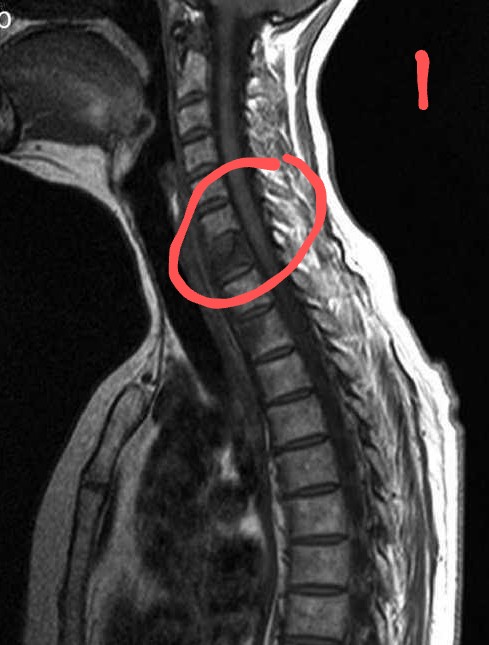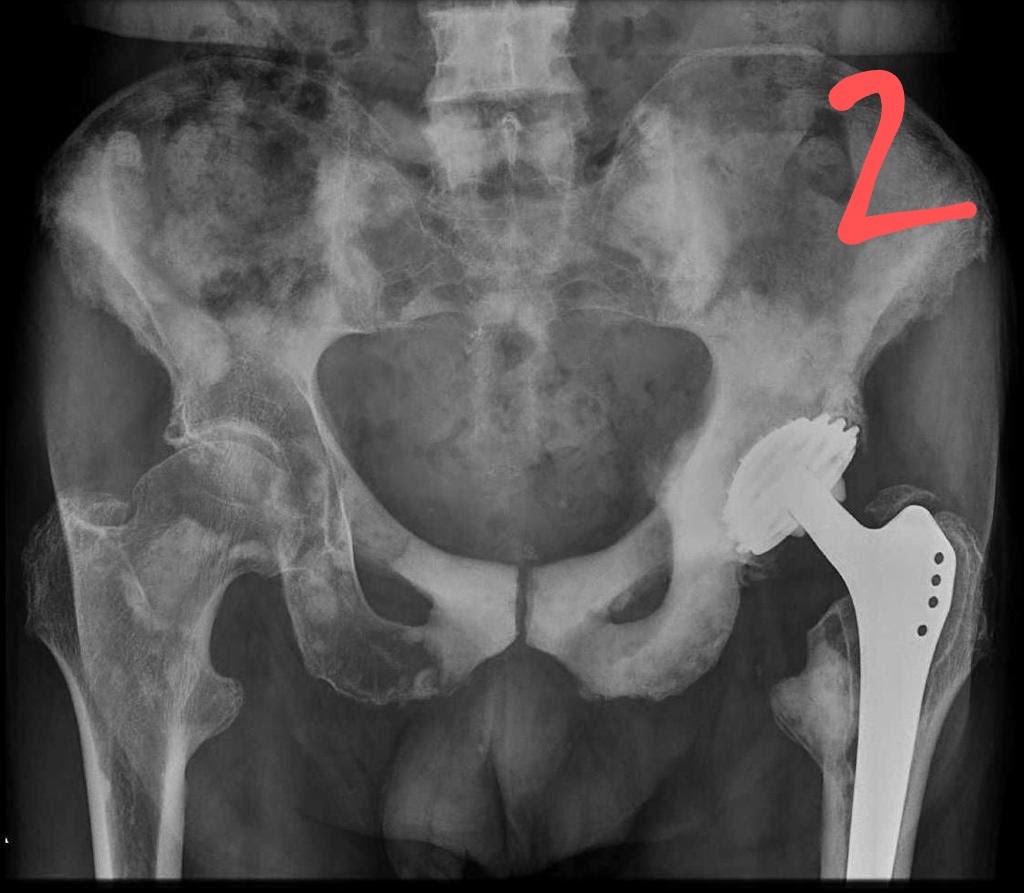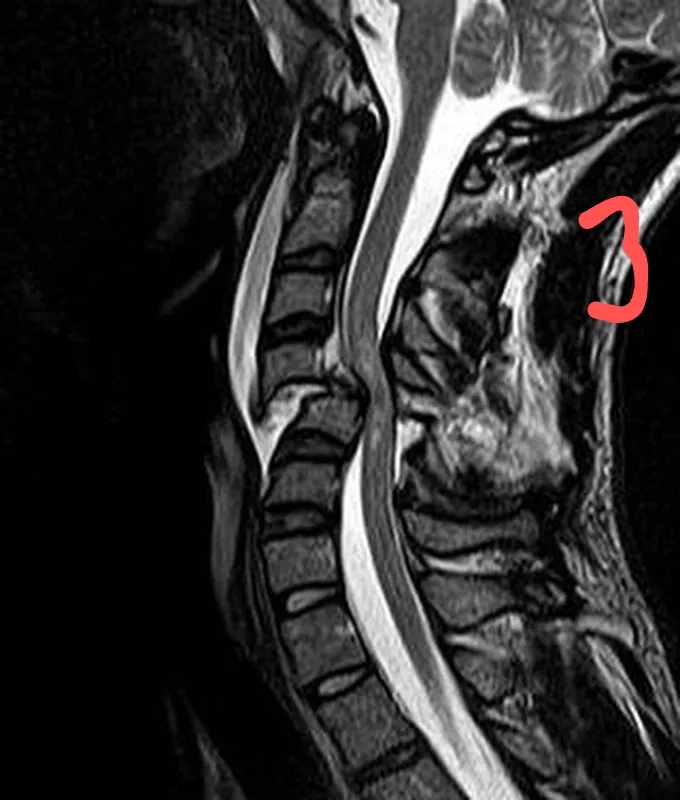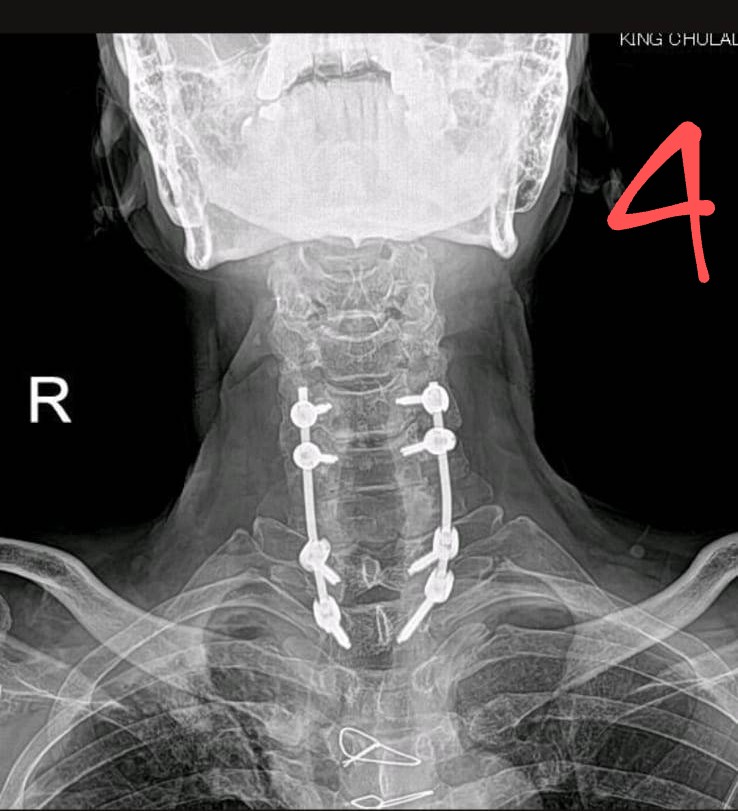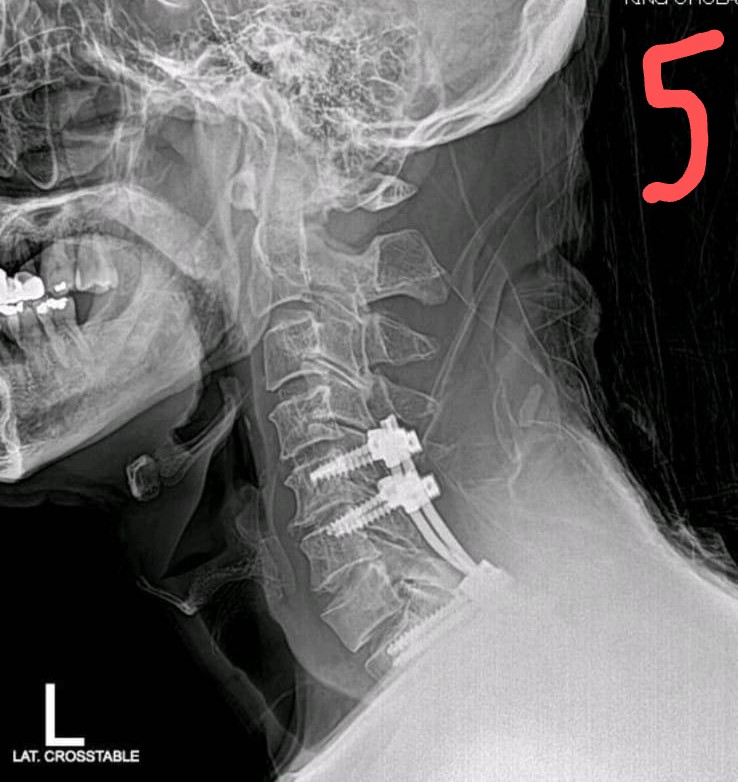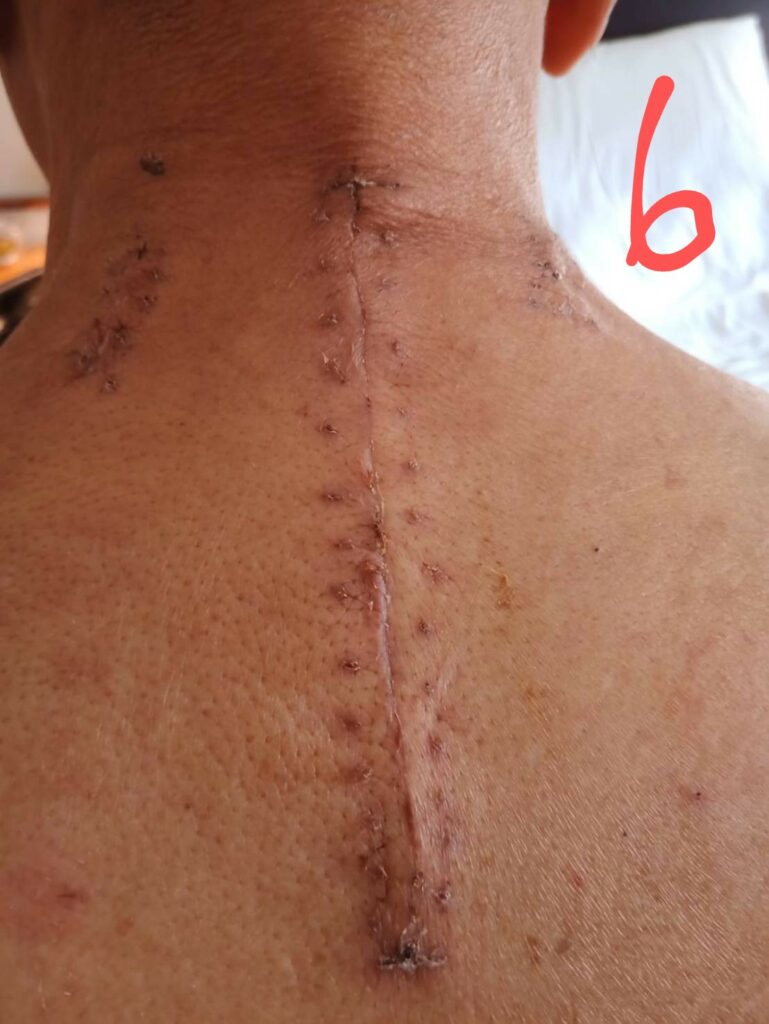1.      On August 21, 2022, Sai, not his real name, a 68-year-old Thai national, was admitted to the Buriram Public Hospital with acute onset paralysis and loss of bladder control. He had suffered prostate symptoms for months prior to this terrible episode.
On admission, his PSA was 66ng/ml (range 0-4). Prostate biopsy: Gleason score: 7 in the left side of his prostate and 9 on the right side. Sai had prostate cancer.
MRI of his neck, 3 days into his admission, demonstrated an osteolytic lesion (thinning of the bone) in the C7 vertebra of his neck, see example photo 1 (not Sai’s radiology). According to his urologist and orthopaedic surgeons, this was metastatic prostate cancer in his neck which had caused his paralysis.
The final diagnosis made by his specialists: Metastatic Stage IV prostate cancer. Recommended treatment: orchiectomy, the removal of his testicles.
Sai declined this recommendation.
He was discharged from the hospital two weeks later when his paralysis had improved.
2.      On 13th September 2022, Sai struggled on two walking sticks into his initial consultation with me.
I listened to his story. For the following reasons, I concluded that his C7 lesion and his paralysis were separate issues and not related to his prostate cancer.
Reason 1. His paralysis was from his nipples down, consistent with a lesion at his 4th thoracic vertebra (T4), not from his compromised C7 vertebra.
Reason 2. During his two-week stay in hospital, the relatively rapid improvement of his paralysis was consistent with Transverse Myelitis, not metastatic cancer. Cancer would continue to grow, increasing his paralysis.
Within a month, his paralysis had resolved completely, which confirmed the Transverse Myelitis diagnosis.
Reason 3. Initially, prostate cancer invariably metastasises to local bone and local lymph nodes, not to the vertebral bodies in the neck.
Reason 4. Prostate secondaries grow in a chaotic manner, see example photo 2. Metastatic prostate disease does not usually cause homogenous thinning of the vertebral body as seen in Sai’s case.
Conclusion: Sai did not have metastatic prostate cancer in his neck and his paralysis was not caused by Stage IV Prostate Cancer.
I warned Sai about the weakness of his C7 vertebra and the potential severity of the condition. A whiplash injury could cause dislocation in his neck resulting in permanent paralysis, see example Photo 3.
3.      The requisite bone scan and abdominal CT to stage his prostate cancer had not been performed. This did not happen until March 2023!
In the interim, on December 12, 2022, Sai underwent surgical stabilisation of his neck, from C5-T2, with Harrington rods and pedicle screws, see photos 4, 5, 6. Following the operation, the pathology report on his C7 vertebral body identified atypical cells only. There was no metastatic prostate malignancy present.
4.      In March 2023, Sai eventually had his prostate cancer staged. The results: There was no evidence of systemic metastatic disease.
Sai did not have Metastatic Stage IV prostate cancer. His disease was confined to his prostate. He had Stage 11 prostate cancer.
By this time, Sai was receiving 3 monthly intramuscular Eligard injections and radiation therapy. Ellegard is a hormone analogue that decreases testosterone levels to suppress the growth of the prostate cancer. It does not cure the cancer.
The side effects of this drug are numerous. In Sai they included sweating, significant loss of energy and impotence.
Sai’s PSA had reduced to 1.54ng/ml. The treatment was working, but he had lost his libido, his physical prowess, and his zest for life. Compared to his active premorbid lifestyle, now his life seemed tedious and somewhat joyless.
Life should be worth living.
5.      I reviewed Sai 2 months ago. We discussed his situation. His Gleason score of 9 (maximum score: 10) indicated that he was suffering from aggressive prostate cancer.
However, his 10-year survival rate was over 80% because treatment had been initiated whilst his tumour was Stage 11, the cancer was contained within his prostate.
6.      Last week he was due his 3-monthly Ellegard injection.
We discussed his treatment going forward. I advised him to cease the Eligard treatment, advice he gratefully accepted. He was to continue his External Beam Radiation Therapy (EBRT). I recommended adding Brachytherapy, a special form of radiation therapy, to his management.
Medical evidence indicates that EBRT and Brachytherapy together have a superior 10-year survival rate compared to treatment by radical prostatectomy, with lymph node resection, and EBRT. It is also superior to EBRT and hormone therapy (androgen suppression therapy) with Eligard.
When next he visited his Oncologist, if deemed appropriate Sai was to request Brachytherapy. If this therapy was inappropriate, he should consider PARD inhibitors, a class of drugs that block the enzymes responsible for DNA repair. This type of therapy has been used successfully to treat cancers with the BRCA mutations.
7.      The two surgical specialists who managed Sai’s care lacked the competence to correctly diagnose his illnesses. It was the Transverse Myelitis that placed him in hospital, not Stage IV prostate cancer.
According to Western medical standards, the Thai Medical Education System is inadequate. A Thai medical degree does not entitle a Thai doctor to practice medicine in the West. This case exemplifies the deficiencies of medical training in Thailand and the lack of scientific knowledge and understanding.
These two ‘home grown’ specialists are teaching and training the Thai medical students and young doctors of today who ipso facto will lack adequate medical knowledge and understanding. It is difficult to rely on home-grown Thai doctors who have not received additional training in the West.
8.      Sai is thankful for the Transverse Myelitis which paralysed him and precipitated his admission to the hospital. Without the admission, his prostate cancer would not have been identified. The early diagnosis of his cancer has improved his chance of survival. If his cancer had reached Stage IV, his future would have been bleak.
I remain confident that Sai will survive at least the next 10 years and that his life will be worth living.
“When is stage IV prostate cancer not stage IV prostate cancer?†When the diagnosis is incorrect.
By Doc Martyn


